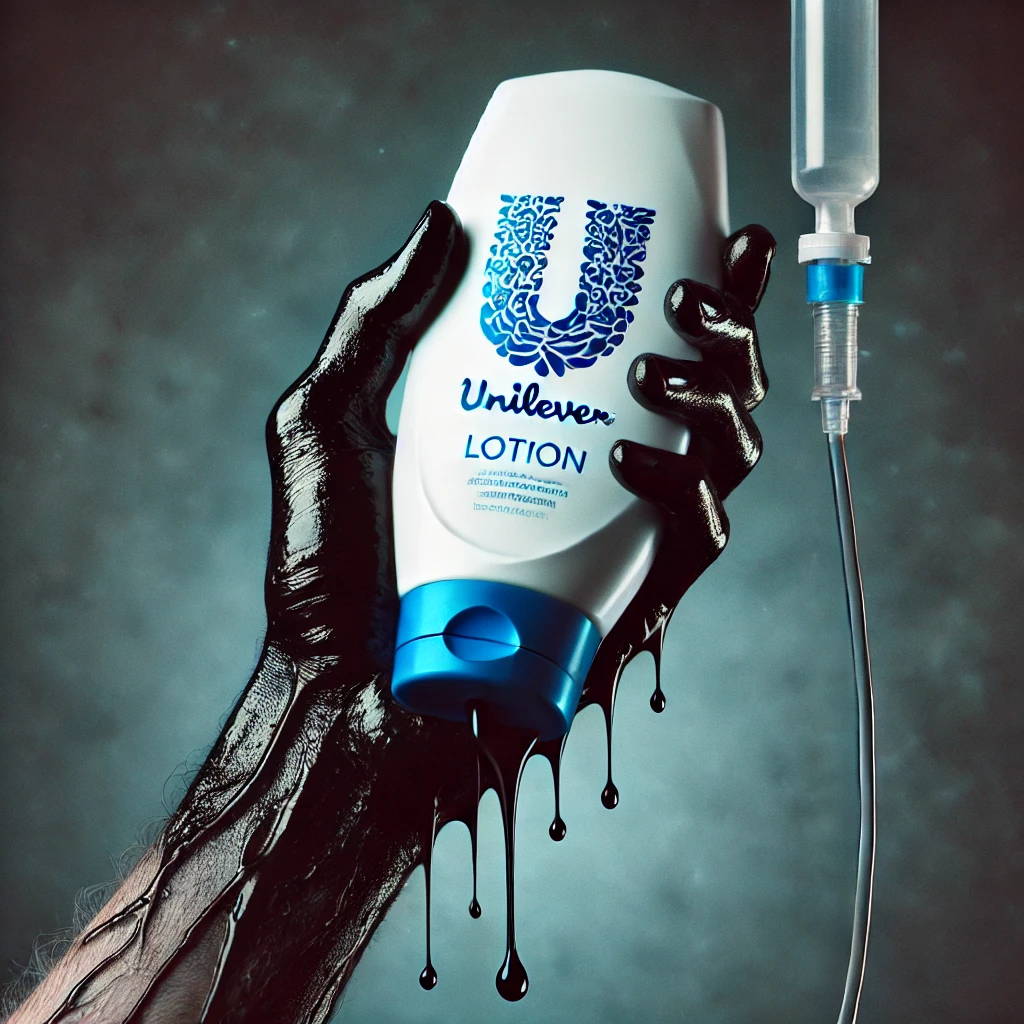I don’t always read the news, but sometimes the comment sections in Cyprus Mail are good for a laugh (seriously, check them out). This morning, one particular article caught my eye.
If you want to waste 5 minutes of your day, feel free to read it. But do it later. We’re not done here.
Corporate PR is a hell of a thing.
Unilever—one of the world’s biggest contributors to environmental destruction, ultra-processed junk food, and toxic household products— is now patting itself on the back for supporting 10 young survivors of serious illnesses by donating part of their sales to fund their studies.
Aww, how sweet. 🥺
Almost like… not selling products that contribute to cancer, metabolic disease, and environmental devastation would’ve been the better option?
But hey, whatever, what do I know.
Unilever: A Generous Cancer-Causing Machine
Let’s take a look at what this “philanthropic” company actually does.
Food That Fuels Disease
Unilever owns brands like Ben & Jerry’s, Magnum, Hellmann’s, Lipton, and Knorr—staples of the ultra-processed food industry. (More on the whole Ben and Jerry’s debacle in a minute). Here’s what that means for public health:
- Less than 20% of Unilever’s food products meet basic health standards. That means the vast majority of what they sell is ultra-processed junk loaded with excessive sugar, salt, and artificial additives—all linked to obesity, diabetes, heart disease, and cancer.
- Unilever makes its food even more unhealthy for poorer countries. A 2023 study found that companies like Unilever sell more highly processed, less nutritious versions of their products in low-income countries while marketing “healthier” versions to wealthier consumers.
- Ultra-processed food increases cancer risk. A major study tracking over 197,000 people found that those consuming the most ultra-processed foods had a 24% higher risk of developing cancer and a 39% increased risk of dying from cancer.
So yes—Unilever is proudly donating money to help (ten!!!) cancer survivors while profiting from foods that literally increase cancer risk.
But let’s move on, shall we?
Toxic Chemicals in Their Beauty & Household Products
If Unilever isn’t making you sick through your diet, they’ve got you covered through personal care and cleaning products.
🚨 Found in Dove, Axe, Sunsilk, Vaseline, Domestos, and Cif:
- Parabens → Found in deodorants, shampoos, and lotions. Mimics estrogen, linked to breast cancer and hormone disruption.
- Phthalates → Used in fragrances and plastics, linked to infertility, birth defects, and hormone disruption—so much so that the EU has banned certain phthalates from cosmetics.
- Formaldehyde-releasing preservatives → Common in shampoos and lotions. Formaldehyde is a known human carcinogen that can cause respiratory issues and skin irritation.
- Sodium hypochlorite (bleach, used in Domestos & Cif) → Linked to lung damage, asthma, and chronic respiratory disease.
So Unilever profits from selling you carcinogenic personal care products… then turns around and funds education for young cancer survivors.
That’s like a tobacco company launching a scholarship fund for people with lung cancer.
But there’s more.
They’ve Been Torturing Animals for Profit Since Forever
Unilever loves to brag about their commitment to non-animal testing. They’ll tell you they’ve been developing alternatives since the 1980s. They’ll talk about their “progress” toward a cruelty-free future.
But here’s the kicker: they still test on animals.
Why? Because in some countries, it’s the law—and rather than refusing to sell there, Unilever just shrugs, grabs a few more rats, and gets back to work.
When you buy Dove, Axe, Vaseline, or Sunsilk, you’re supporting:
🔹 Rabbits having corrosive chemicals rubbed into their shaved skin to see how much it burns.
🔹 Mice and rats force-fed toxic substances until their insides literally give out.
🔹 Animals having products dripped into their eyes to “assess irritation”.
🔹 Being killed at the end of testing, because, obviously.
Oh, but don’t worry—Unilever wants to stop doing it. Eventually.
In the meantime? Tough luck, Flopsy.
Ben & Jerry’s vs. Unilever: A Smackdown in Corporate Hypocrisy
Ah, Ben & Jerry’s. The ice cream brand that names flavours after activism and would probably release a “Defund the Police Pistachio” if they could.
But turns out their parent company, Unilever, isn’t quite as keen on all that “standing up for what’s right” stuff.
Ben & Jerry’s CEO, David Stever, was abruptly removed by Unilever in early 2025. Why? Because he had the audacity to actually stand by the brand’s social values instead of just using them as a marketing gimmick.
What values, you ask? Oh, you know—anti-war stances, climate justice (another hollow PR stunt but still), racial equity, LGBTQ+ rights, and (gasp!) calling out governments that do dodgy things.
Now, this is a bit of a complex matter, since while B&J do stand up for some social justice issues, they’re also a pretty shitty company when it comes to greenwashing, welfare washing, and even vegan-washing [insert stinky hippy joke here]. They are not an ethical or vegan brand by any stretch of the imagination.
Both they and their parent company produce ice cream that’s bad for human health, bad for the planet, and bad for the animals shoved into factory farms to produce their dairy.
Go on, Unilever, tell me again about your “brand values.”
They’re One of the World’s Biggest Polluters
And just in case all of this wasn’t dystopian enough, Unilever is also:
- A top 5 corporate plastic polluter globally and the #1 corporate seller of plastic sachets on the planet. Their single-use plastic waste is found in oceans, beaches, and landfills around the world, and in 2021 alone, they produced over 700,000 metric tons of plastic packaging.
- A major deforestation driver. Unilever is one of the world’s largest buyers of palm oil, a leading cause of rainforest destruction and species extinction. Despite years of promises, they still source palm oil from deforested regions.
- Caught dumping toxic waste. In one major scandal, Unilever’s Kodaikanal thermometer factory in India contaminated water supplies with mercury, poisoning workers and the surrounding community. Unilever eventually signed a settlement with 591 ex-employees, after an alleged 45 employees and 18 children died from toxic effects.
But sure, let’s focus on their charitable donation instead.
The PR Stunt to Cover It All Up
Let’s be clear: Unilever doesn’t care about public health, the environment, or cancer survivors.
They care about profits and reputation management.
- They cause the damage.
- Then they throw a tiny percentage of their billions at “charity.”
- People forget what they actually do, and the cycle continues.
Because if they really gave a flying f*ck:
✅ They’d stop selling toxic, disease-causing products.
✅ They’d stop marketing ultra-processed junk to vulnerable communities.
✅ They’d stop pumping out millions of tonnes of plastic every year.
Instead, they slap “sustainability” and “corporate social responsibility” on their website and hope nobody notices.
Final Thought: Keep Your Charity, Fix Your Industry
Unilever’s “generosity” is the equivalent of setting a house—no, an entire neighbourhood—on fire, then offering to chip in on a bottle of water to help put it out. While simultaneously pouring gasoline on the flames. And claiming to be part of the fire brigade.
If corporations actually stopped selling disease-causing products, we wouldn’t need these ‘goodwill’ initiatives in the first place.
But that wouldn’t be as profitable, would it?
What You Can Do
🔍 Read labels & check ingredients (especially in beauty & cleaning products). Look for the leaping bunny symbol and “vegan” or “cruelty-free” labels.
🌱 Boycott Unilever. Here are their main brands (some are named differently in the EU, but you should recognise the logos). Just don’t buy their crap.
🚫 Support ethical, sustainable brands and small businesses instead of greenwashed mega-corporations.
And don’t fall for the PR spin. Unilever products cause cancer, and by definition, Unilever (and what they stand for) is a form of cancer.


Leave a Reply